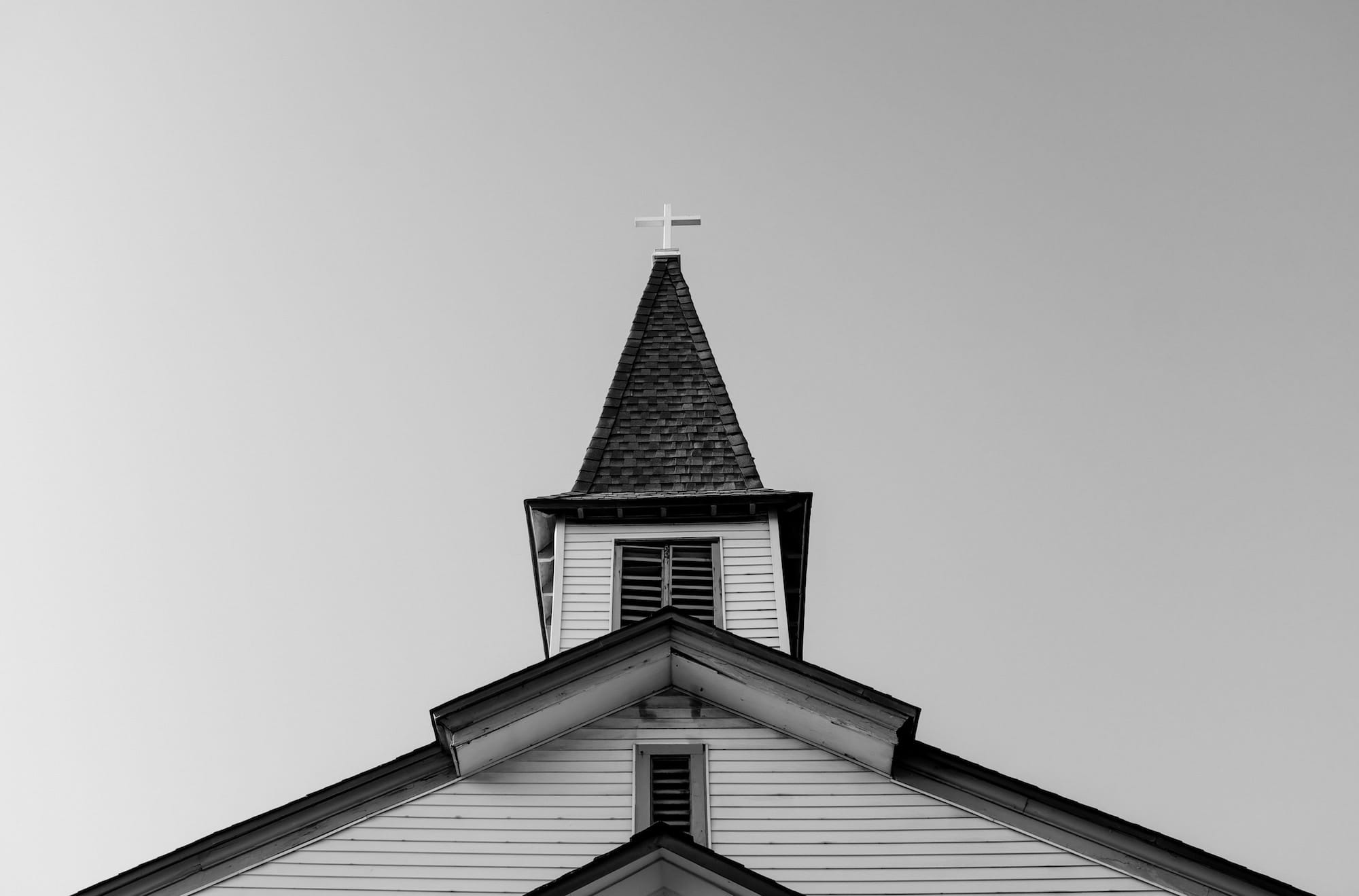This is the darkest chapter of my life, but it is also the most significant milestone in my spiritual journey. Paradoxically, my greatest pain and defeat has turned out to be my greatest satisfaction and triumph. This is also the most difficult chapter to write. I have even struggled for many, many days wondering whether I should tell my story or keep silent forever.
My dilemma is very much like that of a twice-wounded mother in a Korean drama. She was first abandoned by her husband and then disowned by her own son, who mistakenly recognized a rich woman as his mother and knew nothing about his real mother’s existence and all the sacrifices she had made in giving birth to and nursing him. For years, this fictional mother struggled with the question: Should I suffer in silence the pain of betrayal and injustice in order not to ruin my son’s happiness, or should I reveal the truth to him so that he can become a responsible person?
I posted this story on my Facebook page and asked my 5,000 friends what they would choose if they were that mother. Their answers were mostly in favour of telling the truth. Therefore, I have finally decided to tell my story. At this stage in my life, there is no need for me to go through the mud again, but I strongly feel a moral obligation to set the record straight.
The truth may hurt at first, but ultimately it is liberating, healing and transformative. I would be lying if I said that I have never felt any bitterness about my unfair treatment. Initially, it really hurt when numerous people told me that according to the website of Toronto Chinese Gospel Church (TCGC), I did not start the church, but Dr. and Mrs. Vokes did. After more than five decades, the wound has almost healed and I have already buried my pain at the foot of the cross. Therefore, I can now tell my story calmly for the purpose of glorifying God and honoring all those who had actually toiled with me in planting TCGC.
I have already sent my story to several brothers and sisters intimately involved in establishing TCGC for fact-checking. It is my sincere hope that the truth will prevail and TCGC leaders will do the right thing. History matters, especially for the central figures involved. My sacrifices, weekly preaching, and visitations during the three years of church planting would be all lies, if the church history on TCGC’s website were accepted as true.
My Joy at Grace Chinese Gospel Church
A year and a half ago, my wife and I began going to the Grace Chinese Gospel Church (GCGC) in North York. We are most grateful that H. C. and S. S. have been most kind to us ever since we stepped through the church door. H. had become a Christian when I spoke to the Chinese Gospel Youth Group (CGYG) at Keswick Christian Retreat in 1972, and S. served on the Board of TCGC in the mid-70s. Their welcoming smiles have provided a bridge connecting me with the distant past.
It has been a joy to have lunch each Sunday with the cell group after the worship service. Most members of the cell group came from the CGYG. Thus, I am now personally benefiting from the seed I sowed more than 50 years ago. This positive experience has contributed much to the healing of past wounds.
To bring more joy in the new year, Dr. Ted Tham, the newly installed lead pastor for the English congregation of GCGC, has graciously invited me to speak at the retreat for the leaders of the English congregation. Another speaker at the retreat happens to be Steven Chu. Thus, on February 3, 2018, three generations of the Gospel Church leaders will be together on the same platform: I represent the first generation, Steven the second generation, and Ted the third generation.
It is encouraging that just like the early days of TCGC, more than 90% of the English congregation of GCGC are young people—from grade seven students to young couples. In addition, GCGC of North York planted the Peoples Gospel Church.
Since its humble beginning in a Jewish Synagogue on 450 Dundas Street West in 1963, the Toronto Chinese Gospel Church has planted several sister churches, including Milliken Gospel Church, Scarborough Chinese Gospel Church, and Grace Chinese Gospel Church in North York. All these sister churches were started by members from TCGC.
I am truly thankful that the tiny mustard seed I sowed in 1962 in the basement of The Church of the Redeemer with sweat and tears has multiplied and produced much fruit. It has succeeded beyond my wildest expectations; in fact, it seemed like an impossible task at the beginning. I just carried out the mission the best I could without much expectation since the responsibility of starting a church was thrust upon me in spite of my initial resistance.
I am most grateful to God that I am still alive and have the opportunity to tell the world that God has done the impossible and that He was able to use a weak and imperfect instrument to accomplish His plan. Unbeknownst to me, God actually started preparing me for the task of church planting right after my conversion.
At the Mountaintop
After my conversion at the end of 1958, both my spiritual life and life circumstances were on an upward swing. I was quite settled in staying in Hong Kong and serving God. In addition to my writing ministry and carrying on the Navigators ministry with John Szeto, I also joined the young people group of Emmanuel English Church in doing hospital visitations and having impromptu prayer meetings with co-workers in Joy Gospel Church.
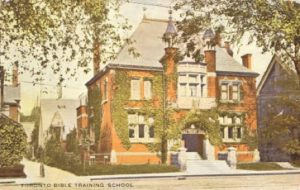
Toronto Bible College on Spadina Road.
All my ministry activities at that time were self-funded, and I took pride in the fact that I have never been paid to serve God all my life. Whenever I received money from my Christian writing or preaching, I always donated back to Christian services. I found it intrinsically rewarding just to share God’s love with others.
Then the unexpected happened in 1960, when my sister Helen (Ch. 8) informed me that she would give me $1,000 CAD to study in Canada, which had always been my desire. After discussing this matter with John Szeto, he suggested that I should attend Toronto Bible College (TBC) and help out at the new Chinese Baptist Church. His recommendation was based on information from his own mentor then living in the USA. Lee Hobel also thought that TBC would be a good place to go. Therefore, I gave up my original idea to study at a regular university in Canada. My father was vehemently opposed to my new plan; he thought that it would be a waste of my talents and there was no future in being a pastor.
It really felt like walking on cloud nine when I received my school acceptance letter and my visa without any obstacles. But it was difficult to say goodbye to my parents in August 1961, not knowing when I would see them again. My mother teared up several times prior to my departure.
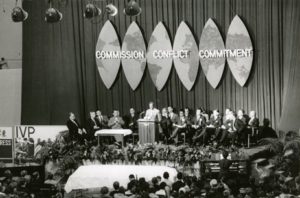
An actual photo of Urbana 1961.
I was able to find a rooming house not too far from TBC on Spadina Road. The school was housed in an old mansion, with high ceilings. People at the school were very warm and friendly. I truly enjoyed my days there. I loved all my teachers—Mr. Simmons’ insightful Bible teaching, Mr. Percy’s inspirational mission lessons, even Mr. Honeyman’s Greek class, which I was not very good in. I enjoyed Bill Crump’s music class; he even said that I had the best male voice among first-year students. I was particularly impressed by Dr. Robert Strimple’s theology lectures, which were always clear, well-argued, and challenging; B. B. Warfield’s book was intellectually stimulating.
I am glad that later Dr. Strimple became Professor and President of the Westminster Theological Seminary in California. Both Barbara Foster (one of my classmates) and I loved his lectures and thought that he was a brilliant scholar. After each theology class, I often borrowed her lecture notes to make sure that I had got everything down correctly. As a result of this friendship, Barbara helped teach Sunday School at TCGC from the very beginning, and I have supported her as a missionary continually ever since the 70s.
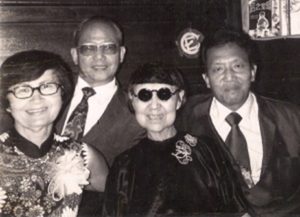
Christina Tsai, flanked by Leona and Ted Choy (left) and Moses Chow (right).
I was so hungry for learning that I took in everything with great eagerness. This exciting spiritual journey included attending the Urbana conference in December 1961. Urbana is a major Christian student missions conference sponsored by InterVarsity Christian Fellowship. The event is designed to inform and encourage Christian students to explore the biblical mandate for missions.
The Urbana conference lasted for five days and ended with a final communion on New Year’s Eve. In addition to numerous inspiring keynote speakers, participants were also exposed to a variety of university and international missions. For me, it was a real mountaintop experience to be caught up in the spiritual energy and excitement of thousands of students on fire for God.
I was fortunate to be exposed to the leaders in the fledgling ministry among overseas Chinese students. Rev. Moses Chow and Ted Choy gave a seminar to about 60 Chinese students at the conference and shared with us their vision for campus Chinese Bible study groups, which were then spreading all across North America in the 60s. Moses and Ted later founded Ambassadors for Christ on May 6, 1963, on a property donated by Queen of the Dark Chamber Christina Tsai. In 1969, Moses became Executive Director of Ambassadors for Christ.
Through the Dark Valley
My descent to the dark valley was totally unexpected. Once the descent began, it was such a steep and slippery path that it could not be stopped until I hit the rock bottom.
After the Urbana conference, the atmosphere at the Chinese Baptist Church1 where I served became a bit chilly. It was a small church still in its infancy. We had our Sunday worship service at the first floor of an old brick house with the second floor rented out. On a typical Sunday, there were about 20 adults in attendance, including the pastor’s mother, wife, and sister. The majority of the congregation were first-generation Chinese immigrant families. The rest consisted of Chinese foreign students and a few young people from Dr. and Mrs. Vokes’ previous Bible Study group.
Pastor EK was a graduate of the Central Baptist Seminary. The unusual thing about Pastor EK was that he was a Canadian-born Chinese (CBC), who could only preach in English in a Chinese Church. He could also speak the Taishan dialectic (台山话) but did not speak or fully understand Cantonese and Mandarin. Therefore, my main function was to interpret for him. At that time, there were very few CBCs willing to serve in Chinese-speaking churches; therefore, I had a lot of respect for his willingness and courage.
The youth pastor was Jack Lem, then in his final year at the Central Baptist Seminary. He happened to be a Pui Ching alumnus also. Therefore, we formed an instant bond. As much as I liked Pastor EK, I was a lot closer to Jack because of our cultural and school ties. My predicament was that the two pastors were not on the best of terms.
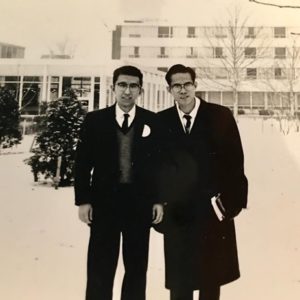
With Jack Lem at Urbana.
When Jack and I were at Urbana, I already sensed some tension between him and Pastor EK. Jack was concerned about his future placement after his graduation because the small church could not support two pastors. After Urbana, their relationship became even more strained.
The bomb exploded shortly before graduation. Jack was devastated by a letter from Dean Brown of Central Baptist Seminary informing him that he had been expelled from both the school and the church because of the serious offense of “insubordination.” Three years of investment in a seminary education against the will of his father ended up with nothing—no degree and no certificate. Jack was not even given a chance to defend himself prior to the expulsion.
I tried to plead with Pastor EK and convince him that Jack really had not said anything bad about him to the young people; they just liked to hang out together and speak to each other in Cantonese. Because of his lack of understanding, Pastor EK suspected that they were plotting against him. My attempt to be a peacemaker failed miserably; Pastor EK turned against me, suspecting that I too was part of Jack’s faction.
During the summer, another bomb exploded. This time, I was expelled from the church and TBC received a letter from Pastor EK that I too should be expelled from the school for “insubordination.” Fortunately, the president of TBC replied stating that I was one of their best students from all the information they had on me; thus, they did not see any reason to expel me.
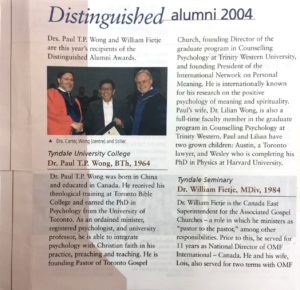
Report on Distinguished Alumni for Tyndale.
I was really moved that TBC honoured me at my graduation with General Academic Excellence and Bible Proficiency Awards. Many years later, Tyndale University College and Seminary, which evolved from TBC, also honoured me as a Distinguished Alumnus along with Dr. Fieje, President of AGC.
That summer, I was deeply distressed to the point that I almost lost my summer job because I was so preoccupied with my church problems while working at the IVCF Bookstore. My boss discovered that I often packed wrong titles for summer conferences and scolded me for bringing my church problems to work.
After discussing with Jack and other young people, we decided to write a joint letter to appeal to the Board of the Baptist Denomination. All we got in return was a simple acknowledgment of receipt of our “evil letter,” and we never heard from them again.
In that summer, a number of young people also left the church in protest against the expulsion of Jack and me. I wondered how Pastor EK could carry on without any help and how the infant church could survive the rupture, which could have been avoided. It pained me deeply that such a small church still could not work together because of cultural and language barriers.
Jack was so disillusioned that he gave up on the Christian ministry and went to New York to explore other opportunities. He left me with all his theology and Bible-related books. I was now all alone, with an unknown future for myself and the brothers and sisters who had left the church of their own accord.
Those were very dark and lonely days. While I was still in Hong Kong, anticipating the wonderful days of serving God in Canada, I could never have imagined that it would end up like this. In Hong Kong, I had many dear brothers and sisters working together in sharing God’s love and was loved by two churches. But now, I was all alone, unfairly abandoned by my church.
At the time, Toong Tung and Alverna Hoi were my strongest supporters. Toong was my roommate in Room 4 of a boarding house. He had just graduated from McGill with an M.Sc. in physics and started working on a research project in Toronto Hydro. He was a typical nerd, socially awkward and quiet, but he could be considered a genius, having completed his Master’s degree when he was only 20.
Alverna Hoi was a housewife living with her mom, three children, and some young boarders. She invited me to her house from time to time to discuss our next steps—whether we should strike out on our own with me as the leader. This idea really did not appeal to me, because I was in no position to start a church.
My second year at TBC began with a darkening cloud over my head. I could not make ends meet, even with part-time work as a bookkeeper at Cohen Buffing Wheels. I only earned one dollar per hour, but it took me more than one hour each day to travel to work. Therefore, I had to write to different foundations for financial support, with only limited success. In addition to my regular academic load, I was also enrolled in two university courses. I could not see how I could take on the huge responsibility of launching a new ministry.
For days and weeks, I wrestled with God like Jesus in the garden of Gethsemane (Matt. 26:36-46) pleading that He would spare me from the cup of suffering. I pointed out the impossibility of starting a new church. I pointed out that I had already dedicated myself to be a Christian psychologist when Dr. Clyde Narramore, founding president of the Rosemead School of Psychology came to TBC and challenged us to serve God through psychology. Therefore, I had 100 reasons why I could not accept the challenge to start a church. However, I could not find clear guidance from God, no matter how hard and how long I cried to Him for help.
At the end, still with considerable doubts, I finally agreed to lead the group (about 10 of them) and start a new venture with their support. This decision was partly based on my conviction that Toronto needed an evangelical testimony. At that time, we already had two mainstream Chinese churches—the United Church and the Presbyterian Church—the Chinese Baptist Church as pastored by Pastor EK would not survive long because of his insecurity and paranoia. Furthermore, I was only willing to devote two to three years to get the church started and then pursue my studies in psychology.
An Uphill Struggle
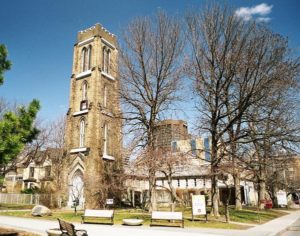
St George the Martyr
This was a scary adventure, not knowing who would show up at the first service. I spent many hours preparing for my first sermon to encourage and inspire the little flock. At the first Sunday Service, there were exactly 12 adults in attendance. Thus, the Toronto Chinese Gospel Church was born.I began to regularly walk around the neighbourhood, scouting for a place for worship. Finally, I decided on the St. George the Martyr, a small Anglican church on John Street, not too far from the Chinese Baptist Church. I talked to the Rector and Brother Lee about borrowing their church for a Chinese worship service on Sunday afternoon. They gladly welcomed us.
In subsequent weeks, more families sent their children to our Sunday School. David Marr was a faithful driver who picked up the children. Harry Ho was the treasurer. Alverna taught Sunday School and Toong helped me with everything, including playing the piano.
The beginning was very slow with new people joining us almost one at a time despite my canvassing the neighborhood. It was difficult but necessary for me to preach in English and interpret it into Cantonese all by myself because we had some CBCs and English-speaking students from TBC helping out. Brother Lee from St. George also attended our service occasionally.
All through 1962, the Vokes still lived in Dungannon, a small town in Ontario, about two and a half hours drive from Toronto. They invited us to their home to inquire about the new work and offer their prayer support. They also expressed their willingness to help purchase a property for this new work.
In the early part of 1963, an agent by the name of Jack Wong found an old Jewish synagogue for sale. It was on Dundas Street West, close to Chinatown. The price was right—only $17,000 CAD. The building was in bad repair, having been abandoned for some time. The basement was musty and full of broken bricks, cobwebs, and junk. However, the building was still structurally sound and perfectly located. We believed that with some renovation, this synagogue had potential for us. Therefore, we bought it with the $3,000 CAD down payment from the Vokes. (Interestingly, a real estate agent approached me in 1964 and offered two million dollars for the church, because Chinatown was moving to Dundas; we turned down the offer because we wanted to serve the Chinese community.)
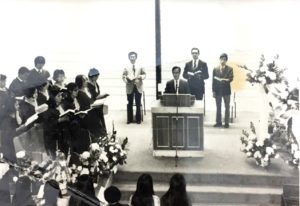
Church service inside the Gospel Church, with Rev. Ho preaching, me on the left, and Eddie Mak on the right.
Our little group was really excited about this new location. Immediately, we set to work to clean up the church so that we could move to Dundas. The timing was perfect because Bother Lee warned me that the Rector was planning to pressure us to become part of his Anglican church.
It was a major undertaking to clean up the old synagogue for our Sunday service and Sunday school. Alverna, Toong, and I spent countless hours cleaning the church. In addition, I also started canvassing the neighbours with Alverna. We invited several neighbourhood boys to church when they were playing marbles on the street. Steve Chu was one of them. I was able to get a group of teenagers to clean up the basement to be their “club” house. It took more than one month of hard work before we could even play ping-pong in the basement.
James Lee and his family were the last ones to join us from the former Chinese Baptist Church. His daughter Jane Lee later became very active in our teens group, known as the Fisherman’s Club. This group later evolved into the Chinese Gospel Youth Group (CGYG) under the caring leadership of Steve and Frances Wong after my departure.
We are grateful to Simon Ng, who married my wife’s sister Eunice. Simon was a freshly minted architect. He took on the Chinese Gospel Church as his first project, designing the renovation and then expanding it in 1973. After this project, he made a career out of building churches in Toronto.
The Good, the Bad, and the Ugly
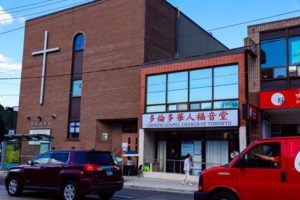
Present-day TCGC on 450 Dundas Street West.
Good things began to happen shortly after we moved to the new location.
First, a total stranger visited me at the church one afternoon. He introduced himself as the Rev. Stephen Knights, a missionary from the Overseas Missionary Fellowship (OMF) on loan to Ambassadors for Christ in Canada to start a new student ministry. Since I was very familiar with the AFC in the USA, I was overjoyed that he would start a similar ministry in Canada.
We had a very good first conversation and decided that he would start a disciple-training program for the Chinese students while his wife Edith would help me with the Sunday School. He also promised that the OMF would support my church planting work with their prayers. After he left, I dropped to my knees to praise God. This was the first confirmation that I had made the right decision to start a new witness in Toronto.
Thus, Rev. Knights began a weekly training program on Saturdays, with an average of 10 young people attending. Edith often shared lunch with me on Sundays; she was such a sweet person who really loved the teenage girls. Rev. Knights, who not only preached at our church from time to time, also introduced a number of young Chinese pastors to me, such as Andrew Wong and Peter Marr, who both later became very prominent Chinese pastors in Toronto. I was most grateful that he later recruited Rev. Ho from Hong Kong to succeed me in the summer of 1968. Needless to say, TCGC had to pay Rev. Ho a decent salary, because he had to support a big family.
Secondly, several nurses came to visit me and offered to help. One of them, Miss Tsai Win Sien (戴永善) dedicated her life to TCGC with passion and faithfulness. She had a big impact on many young people, including H. C., whom I mentioned earlier. When I went to Scarborough Chinese Gospel Church for her memorial service a couple of years ago, I could see how much she was loved and admired.
Thirdly, some members of the University of Toronto Chinese Bible Study Group (TCBSG) stepped in to work alongside me in building up the church. Another important person was Geoffrey Cheung, who had been involved in the Chinese Bible Study Groups of Ottawa, Kingston, and Montreal. He later became Chair of the Board at TCGC for many years and planted the Milliken Gospel Church in 1979 as the first sister church. Lilian, my future wife, also helped out with the piano until she left to teach in Ottawa. Wing Mak, the leader of the TCBSG, supplied the pulpit from time to time until he left for the States to attend Gordon Theological Seminary. Alice Chow was a big help with the Sunday School and visitations since 1964; she later married Wing Mak.
Finally, we had the first evangelistic meeting in the September of 1964, with the Rev. Thomas Wang as the evangelist. I met Thomas Wang at Camp Iawah in the summer that year when the Ontario Chinese Christian Bible Study Groups had their fourth annual retreat there. We connected right away because he was also a close friend of John Szeto. I was grateful for the training I had received at TBC; I was able to organize and train the brothers and sisters at TCGC to do visitations and invite people within a two-mile radius. The meeting was greatly blessed by God and several people came forward to accept Christ.
I am glad that my wife has kept all the monthly prayer letters I sent out as a pastor. She even kept my instructions to church members taking part in the evangelistic campaign. These are historical records available to those who care about the truth of how TCGC was started.
The Devil does not sit idle when God is busy doing good work. There were concerted efforts to harass and discredit me. First, there were threatening phone calls from someone at the Chinese Baptist Church; later, there were harassing phone calls in the middle of the night. I changed my phone number twice, but the harassment continued. They also spread rumors in Chinatown that I was a communist; therefore, they should not come to my church. At that time, most of the people in Chinatown were anti-communists, because many had their family members in China suffering in the hands of the Communist Party of China in endless political movements.
The Vokes did not move to Toronto even after we started meetings at the synagogue on Dundas Street West. That’s why I still visited them in their small town whenever I could. Dr. Arnold Vokes was a kind and sweet retired “x-ray doctor.” He had the same adorable qualities as Lee Hobel. In contrast, Louise Vokes was a strong and over-powering big woman with a penchant to control. She walked slowly with a cane, but she had a quick mind. She often said to me, “Dad (she referred to Arnold as Dad) is a bit confused. Just keep this between you and me.” Therefore, I only shared with her about what was happening at the church and in my personal life.
I regret having shared with her that my brother Giles in Hawaii (Ch. 9) was having financial difficulties and had asked me for help. She offered to loan me $500 CAD and told me not to tell “Dad.” I told her that I could not repay her until I got a fulltime job. “Oh, don’t you worry about it,” she said with a smile and a wink. At that time, it never crossed my mind that she would use that loan to control me and do her biddings.
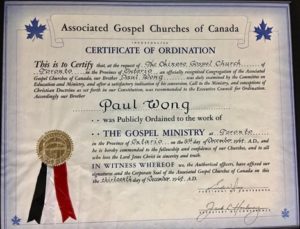
My Certificate of Ordination dated December 13, 1964.
After the Vokes moved to Toronto in 1963, my relationship with Louise Vokes deteriorated gradually, even though I still maintained a good relationship with Dr. Vokes.
After their return to Dungannon, Dr. Arnold Vokes’ farewell letter to my wife dated May 19, 1964 proves two things. First, the Vokes stayed with TCGC only for one year; they could not possibly have started the church in that short period. Second, Arnold Vokes remained my friend to the end, despite Louise Vokes’ increasing conflict with me over church matters. Here are some excerpts from his handwritten letter:
Paul so often preached from the Acts… Paul made me feel as though the spirit of the early days of the Christian Church was still with us — inspiring us to go on in spite of any difficulty. … Of course, there will be opposition unceasing, but infinitely more powerful will be the everlasting arms which will always prevail. We miss the group so much and neither of us could stand saying goodbye to such a faithful group. So with the greatest secrecy we just slipped away. No one will ever know how we felt but we knew it was best to leave when God has made it so manifest that He had called such a well-trained group of modern disciples to carry the responsibility.
My ministry became increasingly difficult, because Louise Vokes opposed all my major initiatives, from joining the Associate Gospel Churches to seeking ordination. What upset me most was that she was able to manipulate a few of her old Bible Study group members and ban foreign students from becoming Church members, even though they did most of the work at the church. This manipulation was designed to contain my support base because I was well-liked by the students. The worst thing she did was to write a confidential letter to Lilian, warning her not to marry me because I was a bad person who borrowed her money without paying back. She even threatened to sue me.
This was a very dirty thing to do to slander God’s servant. I don’t know how widely she had spread the rumour that I refused to pay her back the money. My wife paid her back soon after we got married, but Louise had already damaged my reputation.
After my graduation from TBC in 1964, I worked almost fulltime for the church, but still without any pay. The Board had a meeting and decided not to pay me anything because they allowed me to live upstairs at the synagogue without paying rent. Modelling after Mr. Wu En-Te, I never asked for a salary from the church; that’s why I really did not mind. Besides, my best friend Toong Tung continued to support me whenever I needed some money even without asking for it; he was very attuned to my needs. I was so glad that years later, when I was a professor at Trent University, I was able to return his kindness during those difficult days when he lost his job at General Electric in Peterborough.
Living inside a church had its drawbacks. I lived in an open space upstairs without any room or privacy. I had to answer the door every day. One night, I provided food and shelter for a homeless man, only to find myself robbed next morning—the guy left after cleaning out whatever little money I had in my pocket. On another occasion, I met a Chinese student from mainland China who begged me to take him in because he had no more money to rent a place. Again, out of compassion, I took him in; as a result, I go into trouble with the Deacons of TCGC. They told me that I should not let anyone live in the church without their prior approval. Of course, they were right, not only to protect the church property but also to protect me. I learned that love is not enough—it needs to be guided by practical wisdom.
The second case turned out alright because that student became a Christian and married a nurse in our church. This was the first wedding that took place in 1994. To decorate the church, Ronnie Leung and Wing Chow, young people from Emmanuel English Church in Hong Kong and now helpers at TCGC, spent time and money to make the wedding a beautiful and joyful event.
Now, looking back, I am glad that I had the experience of being a poor church mouse. It was good for my soul to learn the discomforts of going to bed hungry and walking on icy cold streets with holes in my shoes. It was good for character building when I had to support myself cleaning washrooms and doing all sorts of temporary work through Office Overload. It was also for training to live by faith. Modeling after George Müller, I had learned to trust God for all my needs. When I first arrived in Canada, I gave all my money to the Chinese Baptist Church because I forgot to tithe that month. When I was at TBC, I often helped other students in great need with my money. As a volunteer pastor, I never asked for money from anyone. However, God was faithful, and He always provided in miraculous ways.
Epilogue
In a world full of injustice and abuse, what I’ve endured is really not significant, but it should never have happened in God’s family. I feel like the twice-wounded fictional Korean mother described at the beginning of this chapter. In my old age with a successful academic career (Ch. 24), I do not need any recognition from the Gospel Church, but I hope that as a result of telling my story what happened to me would not happen to any other young pastor.
The world believes that might makes right. The rich and powerful can almost do anything to anyone with impunity. But God’s kingdom should be different; it should be regulated by the principles of love and righteousness; church leaders should never sacrifice the powerless and then sweep the dirt under the rug.
The entire experience reported above can be summarized as a “baptism by fire.” It has been very painful to relive that traumatic episode. I wish I could have just forgotten about the whole thing as if nothing had happened, but I needed to re-open the wound for the purpose of cleansing.
I am glad that I was able to visit Mrs. Vokes when she was very sick in the hospital. It was not easy, but I did what I needed to do. She seemed surprised to see me and my wife standing before her. After a while, she looked at me and spoke in a very weak voice, “Paul, you are a good man.” After her confession, I assured her that I would pray for her speedy recovery. I no longer feel any grudge towards her, even though the damage caused by her remains unrepaired.
In short, it is not a matter of claiming credits for myself, but a matter of telling the truth. One can no more build a church simply by purchasing a building than one can build a family simply by buying a house. A great deal of love, sacrifice, and hard work are needed in both cases. The writer of the church history on the TCGC website was grossly misinformed in honouring the Vokes as the founders.
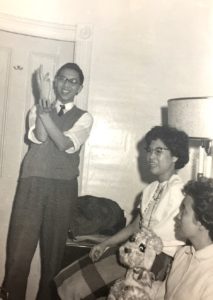
Some people at the Toronto Chinese Bible Study Group: Basil Leung, Lilian Wong, and Ann Ling (left to right).
It would be fine with me if the leaders of TCGC simply state on their website that the Church evolved from the Toronto Chinese Bible Study Group in the 60s because most of the leaders involved in starting TCGC were from the Bible Study Group. In fact, I led both the UofT Chinese Bible Study Group (after Wing Mak’s departure) on campus and the Church Bible Study at TCGC, which involved many of the same people. Finally, we wisely decided to combine the two groups and meet at the church, because I could no longer take good care of both Bible Study groups each week.
However, I have problems with attributing all the credit to Dr. and Mrs. Vokes simply because of their contribution to the down payment; in fact, this is just as unethical as giving the authorship of a scientific paper to the person who provided some seed money for the research project rather than to the scientific team that actually conducted the research and wrote the paper.
When I left TCGC in 1965 in order to get married and pursue further studies in Ottawa, I only weighed 97 pounds and had problems breathing, the result of three years of under-nourishment, overwork, and stress. That experience of baptism by fire had not only purified and strengthened me, but also taught me important lessons of mature happiness. “Count it all joy, my brothers, when you meet trials of various kinds, for you know that the testing of your faith produces steadfastness” (Jam. 1:2-3). I knew that God was preparing me for greater challenges ahead.
When I was on a lecture tour in Taiwan last year, I had the privilege of attending an annual special service of the Bliss and Wisdom Community. It was attended by tens of thousands of members who got together to honour and remember their founder.
I was deeply moved by their devotion to their founder, but it was also very hurtful that the Chinese Gospel Church community would not even acknowledge me as their founding pastor or invite me to their 50th-anniversary celebration. My benign explanation for their lack of respect and gratitude was that they have been misinformed by the fake church history on the TCGC website. However, this argument no longer holds water, if the history on TCGC’s website is not revised even after the publication of my life story.
My final word is that truth matters. Telling untruth is always destructive—it injures the person who has been maligned, it ruins relationships, and it brings dishonour to God’s church. The Bible has clearly admonished against falsehood: “Therefore, laying aside falsehood, speak truth each one of you with his neighbor, for we are members of one another” (Eph. 4:25).
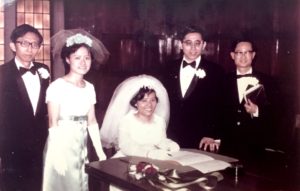
Toong and Hannah’s wedding.
I want to end this chapter by honouring Toong Tung. It would be terribly amiss not to dedicate this chapter to him—my best friend and faithful comrade during those painful days of church planting. I was so glad to be his best man at his wedding officiated by Rev. Ho. I am glad that he married Dr. Hannah Yeung who started attending the Gospel Church simply because she knocked on my door wanting to meet the author she admired when she was in Hong Kong; she was pleasantly surprised that the author turned out to be a young man and the founding pastor of TGCG.
1 This Chinese Baptist Church is unrelated to the Toronto Chinese Baptist Church (TCBC) on Beverley Street, which was started by my friend Rev. Andrew Wong in 1968; TCBC has been greatly blessed by God.
